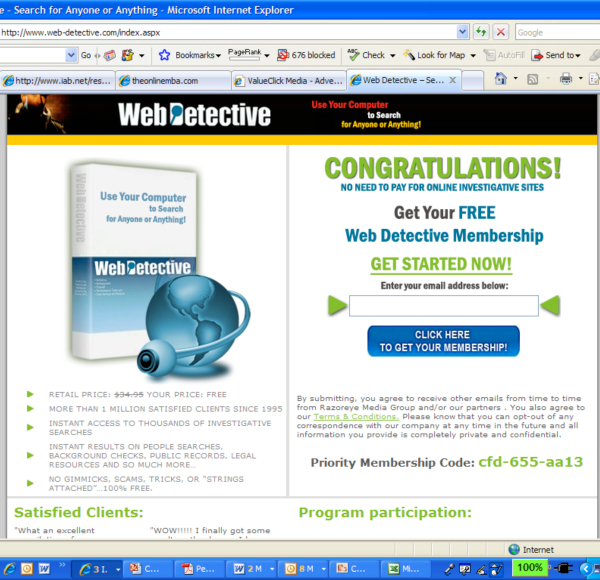Co-registration: How to Make it Work
Co-registration, abbreviated as “co-reg,” is the term Internet marketers use to mean cross-selling offers made by third party affiliates after a visitor has transacted on a website. Here are some typical examples of co-registration:
- A visitor to a cooking site downloads a recipe, and is offered a coupon for a free sample of a new cake mix.
- An appliance buyer registers for a new-product warranty, and is then invited to sign up for a magazine subscription.
- A young professional searches on “online MBA” and is directed to a site where multiple providers of online continuing education pitch their programs.
Also known as “lead generation” marketing, co-registration is a fast-growing category, having jumped 71% between 2005 and 2006. The largest users of this type of Internet marketing are consumer package goods (CPG) companies, automotive, financial services, travel, and telecommunications.
These marketers value co-registration because it allows them an inexpensive way to gather up new prospects. Most co-reg deals are priced on a pay-per-name basis, so marketers don’t need to worry much about targeting or risk reduction. Their offers are served up via a network of website and email list owners. Only customers who are tempted by the offers will raise their hands and agree to be contacted by the marketer later. Depending on the degree of qualification and the data captured, the prospects are priced in the range of 40 cents to $1.
The other reason marketers value co-reg is speed. When Masterfoods was ready to launch a new Pedigree brand dog food designed for puppies less than a year old, co-reg across SendTec’s network was able to generate the names of a million young puppy owners for Pedigree’s marketing campaigns in a mere 6 months.
The industry leaders in creating co-reg networks and managing campaigns are Q Interactive (formerly known as Cool Savings) and ValueClick. But there are thousands of others who offer “leads” on a pay-per-name basis. And this is where the trouble lies.
Many unscrupulous agencies construct co-reg advertising in a way that insufficiently qualifies responders. The response box may be pre-checked, for example, or the explanation of next steps in buried in tiny type or nonexistent. Worse, some of these providers will distribute the names to multiple marketers, charging only a few pennies per name. Marketers will find out very quickly that these names are nearly worthless, but meantime, more unwelcome spam has been generated.

Example of co-reg bad practices. Web Detective states in small type underneath its membership form that registrants are also agreeing to “receive from time to time other emails from Razoreye Media Group and/or our partners.” Some lead generators don’t even disclose this much to registrants.
So savvy marketers have learned to use the medium with care. According to Matt Wise, president and CEO of Q Interactive, marketers should ask their vendors probing questions about such subjects as:
- Who owns the consumer data. Marketers should insist on full ownership.
- Whether consumers are clearly opting in to the relationship with a specified marketer.
- How the data is validated. If offline data is captured, it should be run through postal validation software and fraudulent name filters.
According to Matt Payne, AVP of sales at Topica, a San Francisco agency, marketers must take extra care when handling leads generated by co-registration. “The relationship is still tenuous,” says Payne. “You need to focus on conversion.” His tips for marketers:
- Make your offer very clear, so the co-registrants know what they are signing up for.
- Follow up on the lead immediately, preferably by using an automated outbound email, to begin building a direct relationship with the prospect.
- Tailor your welcome message—so respondents know why you are contacting them—and provide a strong call to action, so the relationship can continue.
As general advertisers are successful using co-reg to promote their products and find new customers, they are inadvertently finding themselves in an unfamiliar environment: database marketing. Says John Ardis, Vice President of ValueClick, “Many marketers are collecting millions of names, but don’t know what to do with them. We are often called in to help our clients mine the data and put in place ongoing communications programs. It’s a new world for traditional advertisers, and we direct marketers are happy to help.”


